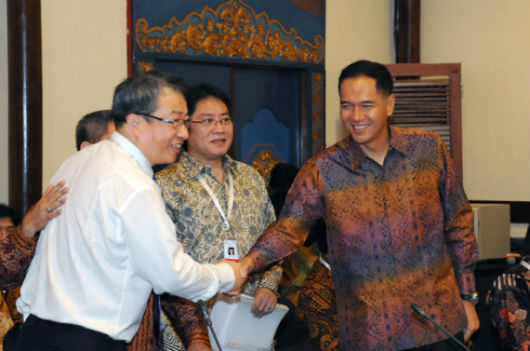——- G-33 Urges WTO Members to Agree on G-33 Proposal ——-
Bali, 2 December 2013 – As many as 46 Ministers or their representatives including those that are also members of the G-33, today (2/12), held a meeting at Melia Hotel in Nusa Dua, Bali. The meeting, which is part of the series of events of the World Trade Organization’s 9th Ministerial Conference, was chaired by the Indonesian Minister of Trade Gita Wirjawan.
“We will discuss efforts to enhance food security, eradicate poverty, and develop underdeveloped regions in developing countries,” said Trade Minister Gita Wirjawan at the press conference held after the meeting.
The meeting also highlights the importance of the Ninth Ministerial Conference in strengthening the role of the WTO as an international organization that ensures a multilateral trade system that is healthy, fair and provides certainty to the global economy.
“In this meeting, the G-33 agreed on the reformation of the agricultural sector and the finalization of the Doha Development Agenda (DDA), including reducing trade barriers which can decrease productivity and competitiveness of millions of farmers in developing countries,” stated the Trade Minister.
Another agreement that was agreed upon in this meeting is recognizing joint problem solving in order to advance negotiations towards a clearer and achievable direction, including emphasizing on the elements in the DDA negotiations which can balance the interest of all member countries in WTO regulations regarding the agricultural sector.
Besides, the Trade Minister also mentioned that the G-33 wanted the proposal of G-33 be agreed upon, specifically the one which is related to the food security. “This proposal is important considering the volatility of world’s food prices, which is continuously increasing,” Trade Minister stated.
The Trade Minister also expressed the hopes of the G-33 that other WTO members approve the G-33 proposal. According to the Trade Minister, the G-33 was disappointed about the impasse that occurred in Geneva and invited the WTO members to find a solution in dealing with the impasse during this MC9 in Bali.
“In this meeting, we see the deep disappointment of the G-33 because the time limit to curtail the export subsidy in 2013 has passed, and in the end an agreement to cut back export subsidies could not be attained in Bali,” the Trade Minister added.
Post-WTO Negotiations in Bali, the G-33 emphasized the need to maintain the momentum of the discussions on the WTO MC9 Package that has brought many advancements in difficult and sensitive sectors. The food security issue in developing countries is also of great importance, causing the G-33 to call for the need for WTO members to be involved in urging a long-term solution post-WTO MC9 in Bali.
In the context of agricultural sector reformation in general, the G-33 meeting in Bali also emphasizes the necessity of an agreement on Special Products (SPs) and Special Safeguards Mechanism (SSM), which could effectively enable developing countries to calculate their development needs.
The members of the G-33 are Antigua and Barbuda, Barbados, Belize, Benin, Botswana, Bolivia, China, the Ivory Coast, Congo, Cuba, Dominica, the Dominican Republic, El Salvador, Grenada, Guatemala, Guyana, Haiti, Honduras, India, Indonesia, Jamaica, Kenya, South Korea, Madagascar, Mauritius, Mongolia, Mozambique, Nicaragua, Nigeria, Pakistan, Panama, Filipina, Peru, Saint Kitts & Nevis, Saint Lucia, Saint Vincent and Grenada, Senegal, Sri Lanka, Suriname, Tanzania, Trinidad and Tobago, Turkey, Uganda, Venezuela, Zambia and Zimbabwe. Besides, the members, Egypt was also present at the meeting as an observer.
Djunari Inggit Waskito
Director of Mulilateral Cooperation
Ministry of Trade


